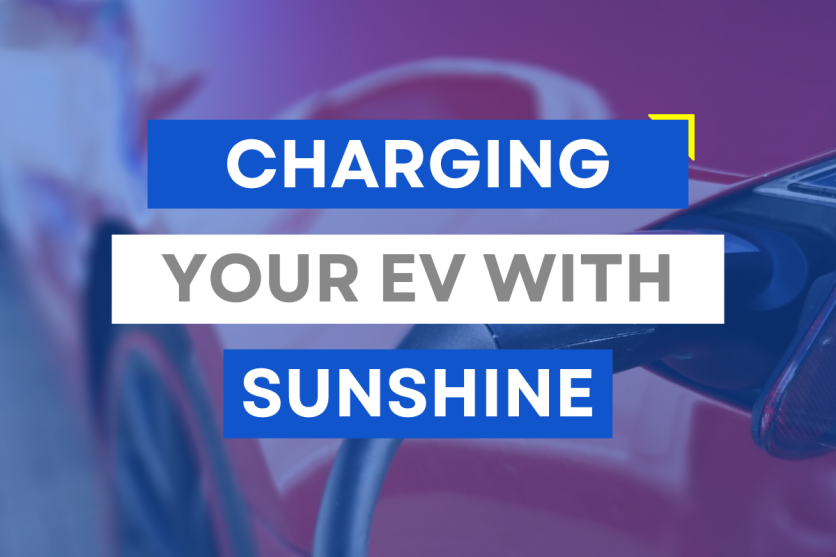
In the quest for a greener future, the adoption of electric vehicles (EVs) has become increasingly crucial. As concerns about climate change and air pollution rise, the transition from traditional gasoline-powered cars to electric vehicles gains momentum. To facilitate this transition and empower homeowners to make informed choices, the Energypal Electric Vehicle Solar Calculator emerges as a powerful tool. It offers homeowners the ability to estimate the savings, environmental impact, and overall benefits of switching to solar and charging an electric vehicle based on their specific driving habits and location.
We cover the 3 essential understandings of solar powered EV charging, the main highlights of this strategy, and how this calculator can help you decide on the right solar solution for your situation.
Solar-Powered EV Charging: 3 Must Knows
Energy Consumption | An electric car uses something called "kilowatt-hours" of energy to travel a certain distance, like a mile or a kilometer. This amount can be different for each electric car and how people drive them. Knowing how much energy your electric car uses is really important to figure out how big of a solar power system you need to charge it. |
Charging Frequency | How often you charge your electric car affects how big the solar panel system should be. If you charge your car every day, you need a bigger system to make enough electricity. But if you don't charge it as often, you have more choices in how big your solar panel system can be. |
Sunlight | The availability and quality of sunlight affect the effectiveness of solar EV charging. Areas with more sunlight, such as regions closer to the equator or with a high number of sunny days per year, are generally more suitable for efficient and reliable solar EV charging. |
EnergyPal has an EV to Solar calculator, that will help you size the right solar system to charge your EV at home
Solar-Powered EV Charging: Main Highlights
Green Energy Source: Charging your EV with solar power means using clean and renewable energy from the sun.
Environmental Benefits: Solar EV charging helps reduce pollution and your carbon footprint, contributing to a healthier planet.
Cost Savings: Generating your electricity from the sun can lower your energy bills and save you money over time. Solar can save homeowners $1,000-2,500+ per year.
Energy Independence: Solar charging allows you to generate your power, making you less reliant on external energy sources. By 2027, nearly 30% of all new behind-the-meter solar systems will be paired with storage, reports the National Renewable Energy Laboratory.
Location Matters: Areas with abundant sunlight are ideal for efficient solar EV charging. For instance, states like California and Texas receive over 2,500 hours of sunlight annually, creating optimal conditions for solar energy production.
Customized Solutions: Tailor the size of your solar panel system according to your charging needs and available space. On average a 5 kW to 10 kW solar system (depending on sun exposure) can offset 100% of your energy needs. Get a free quote here.
Long-Term Investment: Installing a solar charging setup is an investment that can pay off through reduced energy expenses. Solar panels have a lifespan of 25 + years.
Simple Maintenance: Solar panels require minimal maintenance and can last for decades. The National Renewable Energy Laboratory estimates that annual maintenance costs for solar panels are typically around 0.1% of the total system cost.
Sustainable Transportation: Combine solar charging with an EV to embrace a holistic approach to eco-friendly driving. EVs produce fewer emissions than gasoline-powered vehicles, even when considering their manufacturing process.
Community Impact: Leading by example can inspire others to adopt solar-powered solutions for their EVs. 1 in 4 new cars sold in California in the second quarter of 2023 were plug-in electric cars and trucks.
How does the calculator help?
Customized Estimates:
By incorporating user inputs, such as their daily commute distance and vehicle model, Energypal generates a projection of potential savings from charging with solar. The calculator accounts for variables such as shading and the vehicle's energy efficiency. This approach allows users to make well-informed decisions about their EV and the solar panels they need to power it.
Savings Analysis:
One of the key motivators for individuals to switch to electric vehicles is the potential for cost savings. The Energypal Electric Vehicle Calculator excels in breaking down these savings in a clear and transparent manner. The tool provides detailed estimations of fuel savings, maintenance costs, and potential tax incentives, creating a comprehensive view of the long-term financial benefits of owning an electric vehicle. This information can be crucial for budget-conscious consumers and businesses looking to optimize their transportation expenses.
Comparative Analysis:
In addition to providing customized estimates for individual users, Energypal's EV calculator also enables a comparative analysis between different electric vehicle models. By allowing users to input multiple EV options, the calculator can provide a detailed comparison of costs, savings, and environmental impact between various electric vehicles. This feature proves invaluable for potential EV buyers considering solar. It simplifies the decision-making process and enables them to find the most suitable electric vehicle and solar combination for their needs.
As the world embraces the urgency of combating climate change, Energypal's EV calculator plays a crucial role in empowering individuals to make informed decisions that align with a cleaner, greener future. By putting the power of knowledge at their fingertips, Energypal's Electric Vehicle Calculator encourages a collective step towards a more sustainable and responsible tomorrow.




